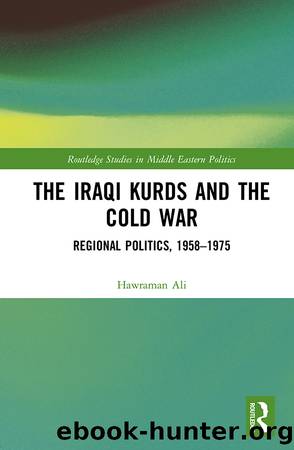The Iraqi Kurds and the Cold War by Hawraman Ali

Author:Hawraman Ali [Ali, Hawraman]
Language: eng
Format: epub
ISBN: 9781000766059
Barnesnoble:
Publisher: Taylor & Francis
Published: 2020-02-17T00:00:00+00:00
The government of Abd al-Rahman al-Bazzaz and the Kurdish Issue
Abd al-Rahman al-Bazzaz, who became the Prime Minister of Iraq on September 21, 1965, was, according to Bazzaz himself in a private conversation with an unnamed US Secretary, âwilling [to] look at [the] Kurdish peoples as [a] nationâ.25 Nevertheless, for progress to be made, he wanted the US and the UK to put pressure on the Shah to stop aiding the Kurds, while at the same time also âpredictingâ26 that there would never be a Kurdish state encompassing all the Kurds. As before, the response given to Bazzazâs request was that the US had limited influence on other countries, including, in this case, Iran. The US, Bazzaz was told, could not simply ask other countries to do what it wanted. Bazzaz was also seeking a rapprochement with the US, but while accusing the Shah of âencouraging disturbances [in] northern Iraq [Kurdistan] for purely destructive reasonsâ and recognising that the âShah's problemâ was his âattitude towards Nasserâ.27
Bazzaz raised the issue of Iranâs backing for the Kurds in his meeting with various US officials, including Vice President Humphrey, having earlier raised it with Department officials. However, the VP did not comment on the Kurdish Issue here, âsaying he was uninformed [of the] detailsâ.28 In a different meeting, âBazzaz raised Kurdish problem in [an] economic sense as [a] drain on Iraq's financesâ.29 This all shows the importance of the Kurdish Issue for Iraq, or rather its effects on Iraq in the absence of a lasting settlement.
Bazzazâs démarche to the US to pressure the Shah to abandon the Kurds appears to have had some success. According to the US ambassador to Iran Armin H. Meyer, who met the Shah in January of 1966, there were at least two long-lasting issues between Iran and Iraqâthe question of the Shatt and Iranâs aid to the Iraqi Kurdsâand the ambassador conveyed to the Shah that the US did not want him to abet the Iraqi Kurds. However, US officials seem to have simply expressed their disapproval of the Shahâs IraqiâKurd policy rather than exert any kind of real pressure. This deduction is based on the ambassadorâs account of the Shahâs view:
[The] Shah indicated he has no intention antagonizing his Kurds by actions against Iraq's Kurds. He described Kurds as [the] âpurest Aryanâ segment of [the] Persian race. [The] Shah's point was that [the] problem of [the] Kurds in Iraq is an internal Iraqi problem, not solvable by âbutcheringâ Kurds and not exportable to Iran.30
This indicates that while the ambassador may have expressed disapproval of the Shahâs backing for the Iraqi Kurds, the Shah had come up with his own reasons to counter the ambassadorâs point. According to the Shah, if he were to take action against the Kurds of Iraq, it would antagonise the Kurds of Iran. In other words, the Shah was essentially implying that he was reluctant to take action against the Iraqi Kurds as this would be counter-productive at home. However, it is to be
Download
This site does not store any files on its server. We only index and link to content provided by other sites. Please contact the content providers to delete copyright contents if any and email us, we'll remove relevant links or contents immediately.
Spell It Out by David Crystal(35852)
Life for Me Ain't Been No Crystal Stair by Susan Sheehan(35539)
Cecilia; Or, Memoirs of an Heiress — Volume 1 by Fanny Burney(32067)
Cecilia; Or, Memoirs of an Heiress — Volume 3 by Fanny Burney(31463)
Cecilia; Or, Memoirs of an Heiress — Volume 2 by Fanny Burney(31413)
The Great Music City by Andrea Baker(30794)
Professional Troublemaker by Luvvie Ajayi Jones(29425)
We're Going to Need More Wine by Gabrielle Union(18640)
Twilight of the Idols With the Antichrist and Ecce Homo by Friedrich Nietzsche(18304)
The Secret History by Donna Tartt(18188)
Cat's cradle by Kurt Vonnegut(14768)
All the Missing Girls by Megan Miranda(14766)
Pimp by Iceberg Slim(13787)
Bombshells: Glamour Girls of a Lifetime by Sullivan Steve(13691)
Fifty Shades Freed by E L James(12923)
Talking to Strangers by Malcolm Gladwell(12887)
Norse Mythology by Gaiman Neil(12847)
The Social Justice Warrior Handbook by Lisa De Pasquale(11957)
Underground: A Human History of the Worlds Beneath Our Feet by Will Hunt(11842)
